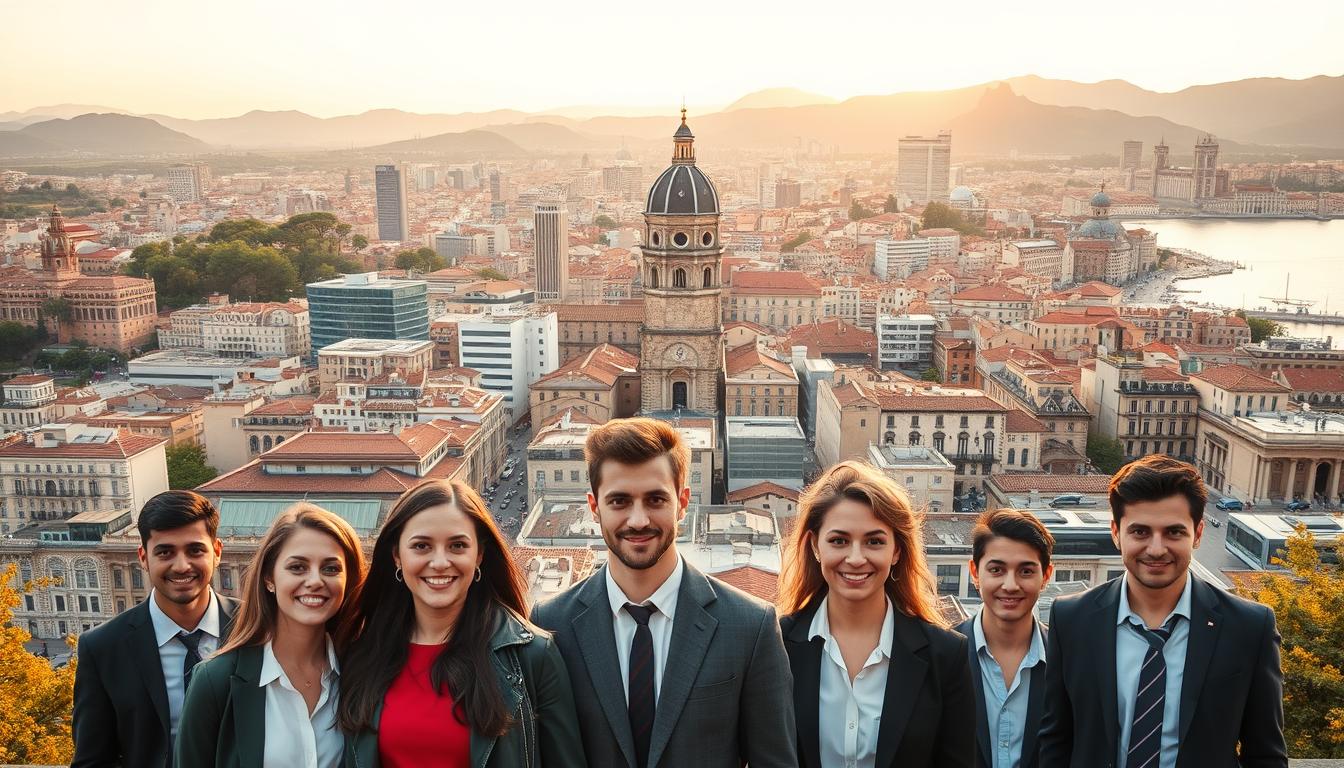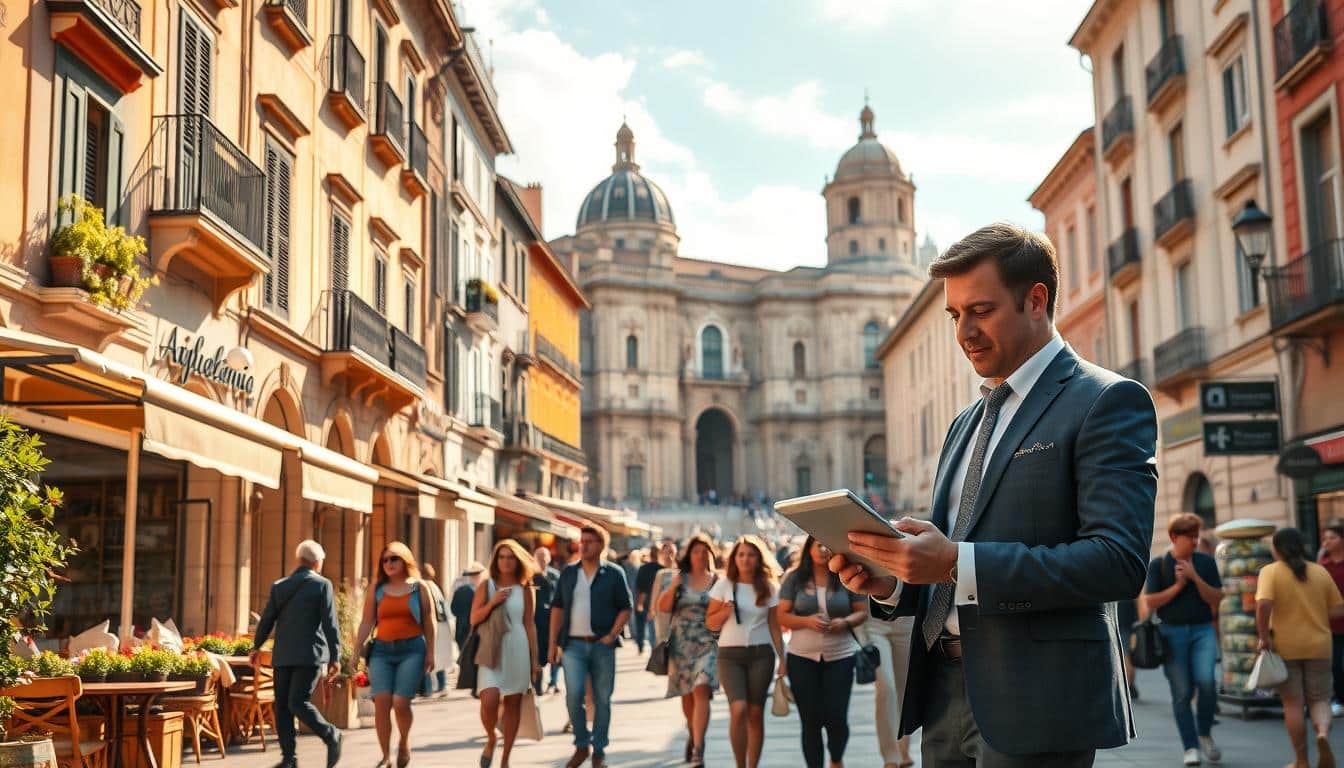For binational couples, the journey to stay together often involves navigating complex immigration processes.
Marriage visas offer a legal pathway to reunite families and build a life together. These visas provide emotional security and legal recognition, making them a popular choice for many.
Anúncios
One of the key advantages is family reunification. Couples can live together without the stress of long-distance relationships. Additionally, these visas open doors to becoming a permanent resident, offering long-term stability.
For Nigerian applicants, the process is streamlined, ensuring a smoother experience. USCIS data shows a 75% approval rate for properly documented marriage petitions. This high success rate highlights the importance of thorough preparation.
Both sponsors and beneficiaries benefit under current immigration laws. Sponsors can support their loved ones, while beneficiaries gain access to new opportunities. This dual advantage makes marriage visas a win-win solution for couples.
For more information explore the official visa website mentioned in this article:
You will be redirected to another website
Introduction to Visa Sponsorship and Marriage Visas
Immigration laws provide options for families to stay united across borders. One such option is the marriage visa, a legal pathway for spouses of citizens or residents to reunite. These visas are designed to simplify the process of family reunification, offering a structured approach to immigration.
The sponsor plays a critical role in this process. They must meet domicile requirements and provide financial support to the beneficiary. This ensures that the couple can build a stable life together without unnecessary hurdles.
Eligibility criteria are straightforward but essential. Both the petitioner and beneficiary must meet specific requirements, including proof of a genuine relationship. For Nigerian applicants, processing timelines may vary, so understanding these details is crucial.
Key forms like the I-130 petition and DS-260 application are central to the process. These documents ensure that all necessary information is submitted accurately, reducing delays. With over 400,000 family petitions processed annually, proper preparation is vital for success.
- Marriage visas offer a legal pathway for spouses to reunite.
- Sponsors must meet domicile and financial requirements.
- Eligibility criteria include proof of a genuine relationship.
- Nigeria-specific considerations may affect processing timelines.
- Key forms include the I-130 petition and DS-260 application.
By understanding these basics, couples can navigate the process more effectively. This ensures a smoother journey toward achieving permanent resident status and building a life together.
Understanding the Basics of Marriage Visas
Navigating immigration pathways can be complex, but understanding the basics simplifies the process. A marriage visa is a legal option for spouses to reunite and build a life together. It provides a structured way to achieve family unity while complying with immigration laws.
What is a Marriage Visa?
A marriage visa is an immigrant visa designed for spouses of citizens or residents. It allows couples to live together and work toward becoming a permanent resident. This visa is a crucial step in the journey to obtaining a green card.
Types of Marriage Visas Available
There are several types of visas for spouses and fiancés. The CR1 and IR1 visas are for married couples. The CR1 is conditional, while the IR1 is unconditional. For couples married less two years, the CR1 requires removing conditions after two years.
The K-1 fiancé visa is for couples planning to marry within 90 days of entry. The K-3 visa is a nonimmigrant option for spouses waiting for their CR1 or IR1 approval. Processing times vary, with CR1 taking 12-18 months and K-1 taking 6-9 months.
Same-sex marriages are eligible under current USCIS policies. Proof of a genuine relationship is required, including joint financial records, photos, and affidavits. Proper documentation ensures a smoother application process.
The Role of Visa Sponsorship in the Immigration Process
Sponsorship plays a pivotal role in helping families reunite through legal immigration pathways. It ensures that applicants have the financial and legal support needed to navigate the process successfully. Sponsors act as a bridge, connecting families and providing stability during this critical journey.
Who Can Be a Sponsor?
To qualify as a sponsor, individuals must meet specific criteria. They must be at least 18 years old and have a domicile in the U.S. Additionally, they must demonstrate financial stability by meeting 125% of the federal poverty guidelines. This ensures they can provide affidavit support to the beneficiary.
Responsibilities of a Visa Sponsor
Sponsors have significant obligations under immigration law. They must provide financial support for up to 10 years, ensuring the beneficiary does not rely on public assistance. This includes calculating household size and income to meet the required threshold.
For those unable to meet the income requirements, joint sponsorship is an option. A joint sponsor can step in to fulfill the financial obligations, ensuring the process continues smoothly. Acceptable assets, such as liquid funds, can also be used to cover income deficits.
“Sponsorship is not just a legal obligation but a commitment to family unity and stability.”
Failure to meet these responsibilities can have serious consequences. Defaulting on sponsorship agreements may lead to legal action and financial penalties. Understanding these duties is crucial for anyone considering this role in the citizenship immigration process.
- Sponsors must meet income and domicile requirements.
- Financial obligations include household size calculations.
- Joint sponsorship is available for income-deficient petitioners.
- Acceptable assets include liquid funds at three times the income deficit.
- Defaulting on sponsorship can result in legal and financial consequences.
By fulfilling these responsibilities, sponsors help their loved ones achieve lawful permanent status. This ensures families can build a stable future together, free from the uncertainties of long-distance separation.
Step-by-Step Guide to Applying for a Marriage Visa
Applying for a legal pathway to reunite with a spouse involves several critical steps. Each stage requires careful attention to detail to ensure a smooth process. Below is a breakdown of the key steps, from filing the petition to submitting the application.
Filing the Petition: Form I-130
The first step is filing the petition alien relative, known as Form I-130. This form establishes the relationship between the petitioner and the beneficiary. It must be submitted to the appropriate USCIS lockbox location. For Nigerian applicants, the Chicago lockbox is typically used.
Accuracy is crucial when completing the form. Any errors can lead to delays or denials. Once submitted, USCIS reviews the petition and notifies the petitioner of its status.
Gathering Required Documentation
After filing the petition, the next step is gathering all necessary civil documents. These include birth certificates, marriage certificates, and police clearance reports. For Nigerian applicants, these documents must be authenticated by the appropriate authorities.
Medical examination results are also required. These must be conducted by an approved physician. Below is a checklist of essential documents:
| Document | Description |
|---|---|
| Birth Certificate | Proof of birth, authenticated by local authorities. |
| Marriage Certificate | Proof of marriage, authenticated by local authorities. |
| Police Clearance | Proof of no criminal record, issued by local police. |
| Medical Exam Results | Conducted by an approved physician, including vaccinations. |
Submitting the Visa Application
Once the petition is approved, the National Visa Center (NVC) takes over. They process the visa application and guide applicants through the next steps. This includes paying fees, submitting additional documents, and scheduling an interview.
For Nigerian applicants, documents are typically submitted via DHL to the Lagos consulate. Ensure all paperwork is organized and meets the required standards. Proper preparation minimizes delays and increases the chances of approval.
“Preparation is the key to a successful application. Ensure every document is accurate and complete.”
By following these steps, applicants can navigate the process with confidence. Proper preparation ensures a smoother journey toward reuniting with a loved one.
Key Requirements for Marriage Visa Applicants
Meeting the requirements for a marriage visa ensures a smoother application process. Applicants must provide proof of a genuine relationship, meet financial support criteria, and complete a medical examination. Proper preparation is essential to avoid delays or denials.
Proof of Relationship
Evidence of a genuine relationship is critical. Acceptable documents include joint bank accounts, photos, and communication logs. These help establish the authenticity of the couple’s bond.
- Joint financial accounts or property ownership.
- Photos of the couple together at various events.
- Communication logs, such as call records or messages.
Financial Support Requirements
Sponsors must demonstrate financial stability. For 2023, the poverty guideline for a two-person household is $24,650. This ensures the beneficiary will not rely on public assistance.
If the sponsor’s income is insufficient, joint sponsorship is an option. Acceptable assets, like liquid funds, can also be used to meet the requirement.
Medical Examination and Vaccinations
Applicants must undergo a medical examination by an approved physician. This includes testing for tuberculosis and meeting vaccination requirements. Approved panel physicians in Lagos and Abuja can conduct these exams.
Required vaccines include MMR, Tdap, varicella, and COVID-19. Exceptions are allowed for religious or medical reasons. Below is a detailed list of mandatory vaccinations:
| Vaccine | Description |
|---|---|
| MMR | Measles, Mumps, and Rubella. |
| Tdap | Tetanus, Diphtheria, and Pertussis. |
| Varicella | Chickenpox vaccine. |
| COVID-19 | Mandatory for all applicants. |
“Preparation is the key to a successful application. Ensure every document is accurate and complete.”
By fulfilling these requirements, applicants can navigate the process with confidence. Proper preparation ensures a smoother journey toward reuniting with a loved one.
The Visa Interview Process
The visa interview is a critical step in the immigration process, requiring thorough preparation. This stage determines whether applicants meet the eligibility criteria for their application. Proper preparation can significantly improve the chances of success.
Preparing for the Interview
Applicants should gather all necessary civil documents before the interview. These include birth certificates, marriage certificates, and police clearance reports. For Nigerian applicants, documents must be authenticated by local authorities.
Security screening is a standard procedure at the U.S. Embassy Abuja. Prohibited items include electronic devices, large bags, and sharp objects. Arriving early and dressing professionally can leave a positive impression.
Common relationship verification questions include:
- How did you meet your spouse?
- What are your future plans together?
- Can you provide evidence of joint financial accounts?
What to Expect During the Interview
The interview typically lasts 10-15 minutes. Consular officers assess the authenticity of the relationship and the completeness of the application. Applicants should answer questions honestly and confidently.
After the interview, administrative processing may take several weeks. This involves additional verification of documents and background checks. Applicants can track their status through the immigration services portal.
“Preparation is the key to a successful visa interview. Ensure all documents are accurate and complete.”
By following these tips, applicants can navigate the interview process with confidence and increase their chances of approval.
Understanding Conditional Residence
Conditional residence is a temporary status granted to individuals who meet specific immigration criteria. It allows them to live and work in the U.S. while working toward permanent residency. This status is typically valid for two years and requires additional steps to convert it into a permanent green card.
What is Conditional Residence?
Conditional residence is often granted to individuals who obtained their green card through marriage. If the marriage is less than two years old at the time of approval, the green card is conditional. This ensures the relationship is genuine and not solely for immigration purposes.
During this period, individuals must maintain their eligibility. Failure to do so can result in the termination of their status. Proper documentation and adherence to requirements are essential to avoid complications.
How to Remove Conditions on Residence
To convert conditional residence into permanent status, individuals must file Form I-751. This petition must be submitted within 90 days before the green card expires. Joint filing is required for married couples, but exceptions exist for those who are divorced or widowed.
Evidence of a genuine relationship is crucial for approval. Below is a list of documents that can strengthen the application:
| Document | Purpose |
|---|---|
| Lease Agreements | Proof of cohabitation. |
| Child Birth Certificates | Evidence of shared responsibilities. |
| Joint Bank Statements | Financial interdependence. |
| Photos and Affidavits | Supporting evidence of a genuine relationship. |
In some cases, USCIS may waive the interview requirement for straightforward applications. Applicants receive an 18-month extension notice while their petition is pending. This ensures they maintain legal status during the review process.
“Proper preparation and accurate documentation are key to successfully removing conditions on residence.”
By understanding these steps, individuals can navigate the process with confidence and secure their permanent residency.
Benefits of Marriage Visas for Couples
Couples seeking to build a life together often find marriage visas to be a reliable solution. These visas not only reunite families but also provide a pathway to long-term stability and opportunities. For many, the benefits extend beyond legal status, fostering emotional security and a shared future.
Uniting Families
One of the most significant advantages is family reunification. Couples can live together without the challenges of long-distance relationships. Immediate relatives are exempt from annual visa caps, ensuring a smoother process for many families.
Work authorization is another key benefit. Through the Employment Authorization Document (EAD), beneficiaries can work while adjusting their status. This provides financial stability and helps couples build a life together.
Pathway to Permanent Residency
Marriage visas often lead to permanent resident status. After three years of marriage, beneficiaries may become eligible for naturalization. This opens doors to full citizenship and its associated rights.
Healthcare access is another advantage. Beneficiaries can enroll in Medicaid or ACA provisions, ensuring they receive necessary medical care. This is particularly important for families starting a new life together.
Family-based preference categories further streamline the process. These categories prioritize immediate relatives, reducing wait times for many applicants. Below is a summary of key benefits:
| Benefit | Description |
|---|---|
| Work Authorization | EAD allows beneficiaries to work while adjusting status. |
| Naturalization Eligibility | After three years of marriage, beneficiaries can apply for citizenship. |
| Healthcare Access | Enrollment in Medicaid or ACA provisions is available. |
| Public Charge Rule Exceptions | Spouse visas are exempt from certain financial requirements. |
“Marriage visas offer more than legal status—they provide a foundation for families to thrive together.”
By understanding these benefits, couples can make informed decisions about their future. Marriage visas are a powerful tool for achieving family unity and long-term stability.
Advantages of Visa Sponsorship for U.S. Citizens
Visa sponsorship offers a unique opportunity for families to reunite and thrive together. It provides a legal framework to bring loved ones closer while ensuring financial and emotional stability. For many, this process is a gateway to building a shared future.
Bringing Loved Ones to the U.S.
One of the primary benefits is the ability to reunite families. Sponsors can bring their spouses, children, or other relatives to live with them. This process is streamlined for immediate relatives, reducing wait times and ensuring a smoother transition.
Joint sponsors and household members’ income can be used to meet financial requirements. This flexibility ensures that more families can qualify for affidavit support, even if the primary sponsor’s income is insufficient.
Legal and Financial Protections
Sponsorship comes with significant legal and financial protections. For example, sponsoring spouses may benefit from income tax deductions. This can ease the financial burden of supporting a loved one.
In cases of divorce, sponsors retain the right to petition without immigration consequences. Protective measures are also in place for victims of domestic violence, ensuring their safety and legal rights.
Child support enforcement across international borders is another key advantage. This ensures that children receive the financial support they need, regardless of location.
Military families enjoy expedited processing, allowing them to reunite faster. This reflects the commitment to supporting those who serve the nation.
“Visa sponsorship is more than a legal process—it’s a commitment to family unity and stability.”
By understanding these advantages, sponsors can navigate the process with confidence. Visa sponsorship is a powerful tool for achieving family reunification and long-term stability in the citizenship immigration journey.
Common Challenges and How to Overcome Them
Applying for a visa can present unexpected hurdles, but understanding common challenges can ease the process. From denials to complex documentation, applicants often face obstacles that require careful navigation. This section provides actionable solutions to help you overcome these issues and move forward with confidence.
Dealing with Visa Denials
Visa denials can be disheartening, but they are not the end of the road. Common reasons include fraud indicators, public charge concerns, or criminal history. If you receive a 221(g) refusal, it means additional documentation is required. Remediation steps include submitting the requested evidence or reapplying with corrected information.
For inadmissibility grounds, waivers may be available. These waivers allow applicants to address specific issues, such as health or criminal concerns. The Administrative Appeals Office (AAO) handles appeals for denied petitions. Below is a summary of the appeal process:
| Step | Action |
|---|---|
| 1 | File Form I-290B within 30 days of denial. |
| 2 | Submit supporting evidence and a detailed explanation. |
| 3 | Wait for AAO review, which can take several months. |
“A denial is not a final decision. With the right approach, you can address the issue and reapply successfully.”
Navigating Complex Documentation
Documentation is a critical part of any visa application. For Nigerian applicants, obtaining a police certificate can be challenging. Ensure your request includes a completed application form, passport photos, and proof of payment. Verification services can help authenticate documents, reducing the risk of delays.
Organizing your paperwork is essential. Below is a checklist to streamline the process:
- Birth and marriage certificates, authenticated by local authorities.
- Police clearance reports, issued by the Nigerian Police Force.
- Medical examination results from an approved physician.
By addressing these challenges proactively, you can improve your chances of success. Proper preparation and attention to detail are key to navigating the visa process smoothly.
Timeline for Visa Processing
Understanding the timeline for visa processing helps applicants plan their journey effectively. Processing times vary depending on the type of application and other factors. Knowing what to expect can reduce stress and improve preparation.
How Long Does It Take?
Current processing times for the I-130 petition range from 10 to 13 months. Once approved, the national visa center takes 3 to 6 months for review. For consular processing, applicants may wait an additional six months for an interview.
Adjustment of status timelines differ slightly. Premium processing is available for certain petitions, reducing wait times significantly. However, security checks for common Nigerian surnames can cause delays.
Factors That Can Affect Processing Time
Several factors influence how long the process takes. These include the volume of applications, security checks, and document accuracy. Tracking the visa bulletin priority date is essential for understanding your place in the queue.
For inquiries, the Lagos consulate provides contact methods to assist with case updates. Below is a summary of key factors affecting processing times:
- Volume of applications at USCIS and the national visa center.
- Security checks for common surnames or backgrounds.
- Accuracy and completeness of submitted documents.
- Availability of premium processing for eligible petitions.
“Preparation and patience are key to navigating the visa processing timeline successfully.”
By understanding these factors, applicants can better manage their expectations and prepare for each step of the process.
Costs Associated with Marriage Visas
Understanding the financial aspects of the process is crucial for applicants. The journey involves several fees and expenses that need careful planning. Proper budgeting ensures a smoother experience and avoids unexpected delays.
Filing Fees
The first step is filing Form I-130, which costs $535. This form establishes the relationship between the petitioner and the beneficiary. Additional fees include $325 for the National Visa Center (NVC) and $220 for the medical examination.
Below is a breakdown of the primary costs:
| Fee Type | Amount |
|---|---|
| Form I-130 Filing | $535 |
| NVC Processing | $325 |
| Medical Examination | $220 |
Fee waivers are available for those who meet specific income criteria. Applicants must submit Form I-912 to request a waiver.
Additional Expenses to Consider
Beyond the primary fees, applicants should budget for other costs. Translation services vary across Nigerian states, with Lagos and Abuja being more expensive. Biometrics fees are also required for certain applications.
Here are some tips to save money:
- Compare translation costs across multiple providers.
- Use government-approved panel physicians for medical exams.
- Ensure all documents are authenticated locally to avoid extra charges.
By planning for these expenses, applicants can avoid financial stress and focus on the application process.
Rights and Protections for Visa Holders
Visa holders in the U.S. are entitled to specific rights and protections under the law. These safeguards ensure fair treatment and access to resources, helping individuals navigate their stay with confidence. Understanding these provisions is crucial for a secure and successful experience.
Understanding Your Rights
Workplace protections are a key aspect of visa holder rights. U.S. labor laws ensure fair wages, safe working conditions, and protection against discrimination. These laws apply regardless of immigration status, providing a safety net for all workers.
For victims of crime, the U visa offers a pathway to legal status. This option is available to those who have suffered substantial mental or physical abuse and are willing to assist law enforcement. It provides a lifeline for individuals in vulnerable situations.
All visa applicants must review the mandatory Rights and Protections pamphlet. This document outlines essential information about legal rights, resources, and support services. It ensures applicants are well-informed before entering the country.
Protections Against Domestic Violence
The Violence Against Women Act (VAWA) allows abused spouses to self-petition for a green card. This provision is available regardless of the abuser’s immigration status. It provides a critical escape route for victims of domestic violence.
Nigerian community resources in major U.S. cities offer additional support. Organizations in cities like Houston, Atlanta, and New York provide counseling, legal aid, and cultural integration services. These resources help individuals rebuild their lives in a new environment.
Temporary Protected Status (TPS) is another safeguard for those fleeing country-specific crises. This status offers work authorization and protection from deportation for individuals from designated countries. It provides stability during times of uncertainty.
“Knowledge of your rights is the first step toward ensuring a safe and secure future in the U.S.”
By understanding these rights and protections, visa holders can navigate their journey with confidence. These safeguards ensure fairness, security, and access to essential resources for a successful stay.
Entering the United States: What to Expect
Arriving in the U.S. marks the beginning of a new chapter for many immigrants. The process involves careful preparation and understanding of specific procedures. This section outlines what to expect during your entry into the United States and how to adjust to life in your new home.
Port of Entry Procedures
At the port of entry, Customs and Border Protection (CBP) officers conduct a thorough inspection. This includes biometric verification and document review. For Nigerian arrivals, major entry points like JFK and Atlanta have streamlined processes to ensure a smooth experience.
Upon approval, you’ll receive an I-551 stamp in your passport. This serves as temporary proof of your permanent resident status until your green card arrives. Keep this document safe, as it’s essential for accessing services and employment.
Adjusting to Life in the U.S.
Once settled, there are several steps to integrate into your new community. School enrollment requires specific vaccinations, such as MMR, Tdap, and varicella. Ensure you have these records ready for a seamless registration process.
Applying for a driver’s license is another priority. Most states require proof of residency, a valid passport, and your I-551 stamp. Below is a checklist of documents needed for this process:
| Document | Purpose |
|---|---|
| Passport | Proof of identity. |
| I-551 Stamp | Temporary proof of residency. |
| Proof of Address | Utility bill or lease agreement. |
Cultural adaptation resources are also available. Organizations in cities like Houston and Atlanta offer support for Nigerian immigrants. These include language classes, job placement services, and community events.
“Preparation and patience are key to a successful transition into life in the U.S.”
By understanding these steps, you can navigate your new environment with confidence and ease.
How to Apply for a Social Security Number
A Social Security Number (SSN) is essential for many aspects of life in the U.S. It is required for employment, opening bank accounts, and accessing government services. For new immigrants, obtaining an SSN is a critical step in settling into their new environment.
Steps to Obtain Your SSN
The process begins with the DS-260 form. During the visa application, applicants can opt-in for automatic SSN issuance. This simplifies the process, as the Social Security Administration (SSA) will issue the number upon arrival.
For in-person applications, visit a local SSA office. Required documents include:
- Passport with permanent resident status.
- Birth certificate or other proof of age.
- Form I-94 or I-551 stamp.
Processing typically takes 2-4 weeks. For Nigerian immigrants, SSA offices in cities like Houston, Atlanta, and New York are accessible.
Importance of the Social Security Number
An SSN is more than just a number. It is a gateway to financial independence and stability. Without it, many essential services remain out of reach.
Be cautious of scams targeting new immigrants. Legitimate SSN applications are free, and the SSA will never ask for payment over the phone or email.
While waiting for an SSN, consider applying for an Individual Taxpayer Identification Number (ITIN). This allows you to file taxes and open certain accounts temporarily.
“Your Social Security Number is your key to unlocking opportunities in the U.S. Protect it and use it wisely.”
By following these steps, you can secure your SSN and take the first step toward building a stable future in your new home.
Conclusion: Embracing the Benefits of Visa Sponsorship and Marriage Visas
Family-based immigration offers a pathway to reunite loved ones and build a future together. For Nigerian applicants, early preparation is key to success. Proper documentation and understanding the process can significantly improve approval rates.
Success rates are high for well-prepared applications, with many families achieving their goals. Upcoming fee changes in 2024 may affect costs, so staying informed is essential. A final checklist can help ensure all requirements are met.
By embracing the benefits of this process, families can create a stable foundation in the united states. With careful planning and attention to detail, the journey becomes smoother and more rewarding.
FAQ
What is a marriage visa?
A marriage visa allows a foreign spouse to enter and live in the U.S. with their partner who is a citizen or lawful permanent resident. It is an immigrant visa that leads to permanent resident status.
Who can sponsor a marriage visa?
A U.S. citizen or lawful permanent resident can sponsor their spouse by filing Form I-130, Petition for Alien Relative, with USCIS. The sponsor must meet financial requirements to support the applicant.
What documents are needed for a marriage visa application?
Required documents include proof of relationship, civil documents like birth certificates, an affidavit of support, and results from a medical examination. Additional paperwork may vary based on individual cases.
How long does it take to process a marriage visa?
Processing times vary but typically take six months to over a year. Factors like case complexity, USCIS workload, and the National Visa Center’s processing speed can affect the timeline.
What is conditional residence?
Conditional residence applies to couples married less than two years at the time of entry. It requires filing Form I-751 to remove conditions and obtain permanent resident status after two years.
What happens during the visa interview?
The interview is conducted by a consular officer to verify the relationship and eligibility. Applicants must bring all required documents and be prepared to answer questions about their marriage and background.
What are the financial requirements for a sponsor?
Sponsors must meet income thresholds set by the Department of State, typically 125% of the federal poverty guidelines. They must submit an affidavit of support to prove financial capability.
Can a marriage visa be denied?
Yes, a visa can be denied due to incomplete documentation, insufficient proof of relationship, or failure to meet eligibility criteria. Applicants can address issues and reapply if necessary.
What rights do marriage visa holders have?
Visa holders can live and work in the U.S., access healthcare, and apply for a Social Security Number. They are also protected under U.S. laws, including those against domestic violence.
How do I apply for a Social Security Number?
After entering the U.S., applicants can visit a Social Security Administration office with their immigrant visa and passport to apply. The SSN is essential for employment and other services.






